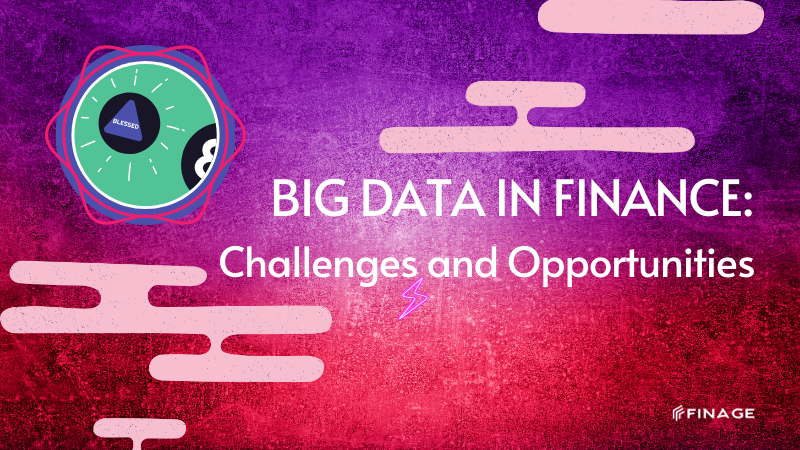Big Data in Finance: Challenges and Opportunities
5 min read • August 14, 2023

Introduction
The integration of big data into the financial industry has sparked a paradigm shift, unlocking a vast trove of structured and unstructured data sources ripe for exploration. This influx of data offers unprecedented opportunities to extract valuable insights crucial for market analysis, risk assessment, and tailored customer services. Big data's impact is far-reaching, empowering financial institutions with the potential to leverage machine learning models for predictive analytics, identifying market trends, and making informed decisions in real time. Nevertheless, the effective utilization of this abundant data poses intricate challenges that the financial sector must navigate to fully capitalize on its potential.
Amidst the promises of big data in finance lies a web of challenges waiting to be addressed. The sheer volume, velocity, and variety of data require robust infrastructure and sophisticated analytics tools capable of managing, processing, and deriving actionable insights effectively. Security and privacy concerns loom large, necessitating stringent measures to safeguard sensitive financial information from cyber threats and regulatory compliance. Furthermore, ensuring data accuracy, quality, and relevance while handling massive datasets presents a formidable challenge that financial institutions must confront to derive meaningful and accurate conclusions.
Despite these challenges, big data offers an array of opportunities for the financial sector. Through data-driven insights, financial institutions can enhance customer experiences by offering personalized services tailored to individual needs and preferences. Additionally, big data analytics empowers proactive risk management strategies, enabling timely identification and mitigation of potential risks, thereby enhancing overall operational efficiency and regulatory compliance. Our forthcoming blog post delves deeper into the intricate dynamics of big data in finance, dissecting its challenges and the transformative potential it holds for reshaping the financial industry.
Table of Contents
- The Rise of Big Data in Finance
- Definition and Scope
- Evolution of Data Analysis in Finance
- Opportunities Presented by Big Data
- Enhanced Risk Management
- Personalized Customer Experience
- Real-time Analytics and Decision Making
- Challenges in Utilizing Big Data
- Data Quality and Management
- Privacy and Security Concerns
- Integrating with Legacy Systems
- Technological Innovations and Tools
- AI and Machine Learning
- Blockchain in Data Security
- Cloud Computing
- Regulatory Landscape
- Compliance with Global Regulations
- Data Protection Laws
- The Future of Big Data in Finance
- Predictive Analysis and Market Movements
- The Role of Quantum Computing
- Conclusion
The Rise of Big Data in Finance
Definition and Scope
Big data encompasses a vast volume of data that is collected, processed, and analyzed to gain insights. In finance, this data can range from transaction histories and stock prices to social media sentiment and economic reports.
Evolution of Data Analysis in Finance
The finance sector has transitioned from traditional analytics to more sophisticated data analysis powered by big data technologies. This shift is enabling deeper insights into market dynamics and customer behavior.
Opportunities Presented by Big Data
Enhanced Risk Management
Big data analytics can identify patterns that signal potential risks, allowing financial institutions to take proactive measures to mitigate them.
Personalized Customer Experience
Financial services can leverage big data to tailor products and services to individual customer needs, leading to higher satisfaction and loyalty.
Real-time Analytics and Decision Making
Big data tools enable real-time analysis of market trends, helping traders and investors make informed decisions quickly.
Challenges in Utilizing Big Data
Data Quality and Management
Ensuring the accuracy and cleanliness of large datasets is a significant challenge, as poor data quality can lead to incorrect conclusions.
Privacy and Security Concerns
The handling of sensitive financial data requires robust security measures to prevent breaches and maintain customer trust.
Integrating with Legacy Systems
Many financial institutions operate on outdated systems that are not optimized for the scale and complexity of big data analytics.
Technological Innovations and Tools
AI and Machine Learning
Artificial intelligence and machine learning algorithms can process and analyze big data more efficiently, providing advanced insights into financial forecasting and customer preferences.
Blockchain in Data Security
Blockchain technology can enhance data security and integrity in financial transactions by creating immutable records and transparent audit trails.
Cloud Computing
Cloud computing offers scalable solutions for storing and processing large amounts of data, facilitating access to big data analytics.
Regulatory Landscape
Compliance with Global Regulations
Financial institutions must navigate a complex web of regulations when handling big data, ensuring compliance with laws across different jurisdictions.
Data Protection Laws
Strict data protection laws like the GDPR in Europe place additional burdens on financial firms to manage customer data responsibly.
The Future of Big Data in Finance
Predictive Analysis and Market Movements
Big data is set to become increasingly predictive, offering the ability to forecast market movements and consumer trends with greater accuracy.
The Role of Quantum Computing
Quantum computing could exponentially increase the speed and capacity of data processing, opening new frontiers in financial analysis.
Conclusion
The finance industry stands at the precipice of a profound transformation driven by the immense possibilities of big data. Its potential to revolutionize operations, decision-making, and customer experiences is unparalleled. Yet, the realization of these prospects demands a concerted effort to surmount substantial hurdles. Challenges loom large, especially in the realms of efficient data management, stringent security measures, and navigating complex regulatory landscapes. The effective utilization of big data hinges on the industry's ability to address these obstacles adeptly.
In the relentless march of technological progress, the finance sector finds itself at a critical juncture, necessitating swift adaptation and evolution. As innovations in data analytics and machine learning surge forward, the industry faces both opportunities and risks. Embracing these advancements calls for a harmonious integration of cutting-edge technologies with robust frameworks that uphold data integrity, safeguard privacy, and ensure compliance with evolving regulations. To harness the full power of big data, financial institutions must recalibrate strategies, fortify infrastructure, and cultivate a culture of agility and innovation, thereby positioning themselves to thrive in a data-driven future.
You can get your Real-Time and Historical Market Data with a free API key.
Build with us today!
Claim Your Free API Key Today
Access stock, forex and crypto market data with a free API key—no credit card required.

Stay Informed, Stay Ahead
Finage Blog: Data-Driven Insights & Ideas
Discover company news, announcements, updates, guides and more


